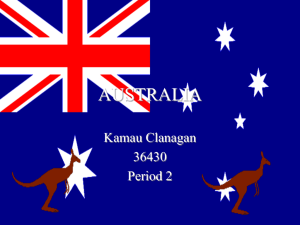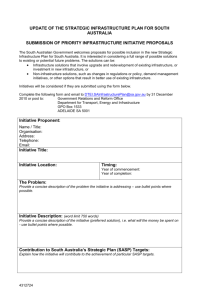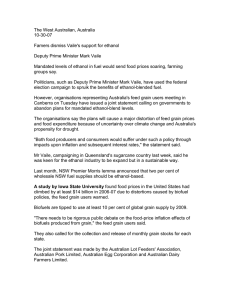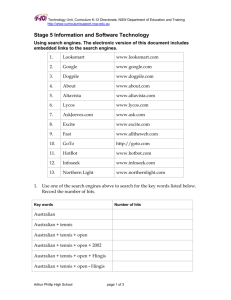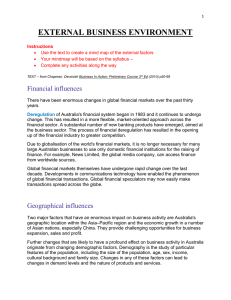Submission cover sheet - Parallel Importation of Books
advertisement
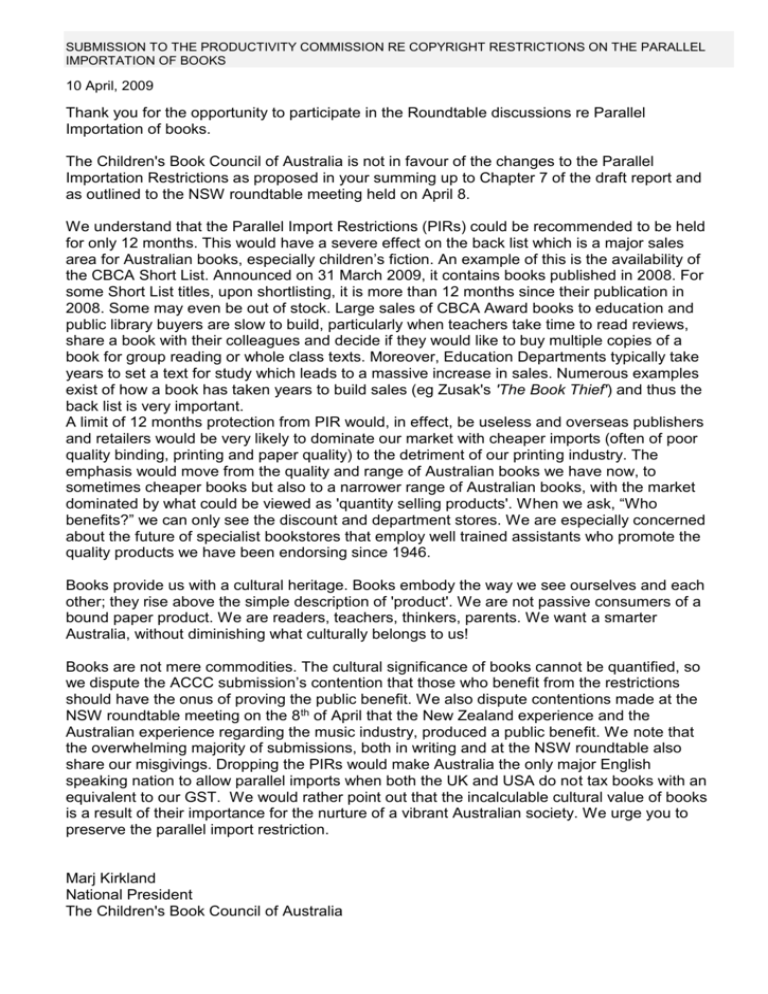
SUBMISSION TO THE PRODUCTIVITY COMMISSION RE COPYRIGHT RESTRICTIONS ON THE PARALLEL IMPORTATION OF BOOKS 10 April, 2009 Thank you for the opportunity to participate in the Roundtable discussions re Parallel Importation of books. The Children's Book Council of Australia is not in favour of the changes to the Parallel Importation Restrictions as proposed in your summing up to Chapter 7 of the draft report and as outlined to the NSW roundtable meeting held on April 8. We understand that the Parallel Import Restrictions (PIRs) could be recommended to be held for only 12 months. This would have a severe effect on the back list which is a major sales area for Australian books, especially children’s fiction. An example of this is the availability of the CBCA Short List. Announced on 31 March 2009, it contains books published in 2008. For some Short List titles, upon shortlisting, it is more than 12 months since their publication in 2008. Some may even be out of stock. Large sales of CBCA Award books to education and public library buyers are slow to build, particularly when teachers take time to read reviews, share a book with their colleagues and decide if they would like to buy multiple copies of a book for group reading or whole class texts. Moreover, Education Departments typically take years to set a text for study which leads to a massive increase in sales. Numerous examples exist of how a book has taken years to build sales (eg Zusak's 'The Book Thief') and thus the back list is very important. A limit of 12 months protection from PIR would, in effect, be useless and overseas publishers and retailers would be very likely to dominate our market with cheaper imports (often of poor quality binding, printing and paper quality) to the detriment of our printing industry. The emphasis would move from the quality and range of Australian books we have now, to sometimes cheaper books but also to a narrower range of Australian books, with the market dominated by what could be viewed as 'quantity selling products'. When we ask, “Who benefits?” we can only see the discount and department stores. We are especially concerned about the future of specialist bookstores that employ well trained assistants who promote the quality products we have been endorsing since 1946. Books provide us with a cultural heritage. Books embody the way we see ourselves and each other; they rise above the simple description of 'product'. We are not passive consumers of a bound paper product. We are readers, teachers, thinkers, parents. We want a smarter Australia, without diminishing what culturally belongs to us! Books are not mere commodities. The cultural significance of books cannot be quantified, so we dispute the ACCC submission’s contention that those who benefit from the restrictions should have the onus of proving the public benefit. We also dispute contentions made at the NSW roundtable meeting on the 8th of April that the New Zealand experience and the Australian experience regarding the music industry, produced a public benefit. We note that the overwhelming majority of submissions, both in writing and at the NSW roundtable also share our misgivings. Dropping the PIRs would make Australia the only major English speaking nation to allow parallel imports when both the UK and USA do not tax books with an equivalent to our GST. We would rather point out that the incalculable cultural value of books is a result of their importance for the nurture of a vibrant Australian society. We urge you to preserve the parallel import restriction. Marj Kirkland National President The Children's Book Council of Australia



